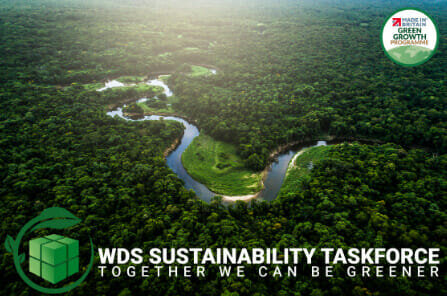While sustainability is a target for heavier industries, its priority in standard parts and components sourcing is rising. Just as measures are being put into place along the supply chain, customers are increasingly sustainability aware. The market of tomorrow will demand environmental and social commitments from parts and components suppliers, and the companies that are already taking sustainability seriously can demonstrate what can be achieved.
Edward Arnott, WDS Components Sales Manager and Sustainability Task Force Lead, explains more.
As awareness grows of ecological importance, and the impact that industry and commerce has upon it, demand for action is spreading to stakeholders in more diverse sectors and businesses. Individually, standard parts and components might not seem to carry the same importance as heavier products and processes, but their impact is very real. From bolts to hinges, their essential use means these parts are all around us, in our daily lives as well as industry, and their supply chain is long reaching. Sustainability conscious employees at standard parts and components suppliers are taking action, and customers are increasingly demanding commitments as well.
Not that environmental care is new. WDS Components has long had an Eco Task Force that has investigated ecology impact and made commitments such as reducing energy use. But sustainability is broader, and resulting actions have a wider impact. For WDS, sustainability means fulfilling the needs of current generations without compromising on the needs of future generations, whilst ensuring a balance between economic growth, environmental care, and social wellbeing.
Sustainability Task Force
Today at WDS, action is driven by the Sustainability Task Force. Comprising members from all departments, this ensures that the whole business takes action. This approach creates a scope that ranges from facility management of our Leeds factory, through to product development. The task force also includes all levels of seniority in the business, from junior employees to director-level. Not only does this create innovative thinking on the issues that matter, but it also helps to ensure the sustainability and longevity of WDS itself, and its place in business and society.
The Sustainability Task Force is driven by the mission to influence WDS Components in its endeavours to use less of the earth’s valuable resources. This is in effort to reduce the harmful effects of climate change, by becoming more sustainable, in order to improve the health and wellbeing of our colleagues, wider society, and future generations. The result is a prioritised matrix of practical actions, spanning all aspects of WDS’ operation, that cover both the short and long term.
Sustainability actions
Considering emissions required in transportation, our goal is to manufacture as much as possible at our Leeds plant. This year we’ve expanded our in-house production capacity with new, additional CNC lines, enabling WDS to increase its UK production even further. For UK and European OEMs and end users, this significantly reduces the carbon dioxide equivalent (CO2e) of the parts and components they buy.
We’re also in the process of fitting energy usage monitors to all of our production machines, to give a detailed view of energy usage to ensure their most efficient mode of operation. This also combines with other initiatives around our UK plant, from using the most efficient light fittings, to ensuring our utility providers use renewable sources. As a result, we reduced our electricity and gas use by 3.5% last year, and we’re on track to exceed that figure this year.
As well as sustainable production, we’ve also implemented a range of sustainable business practices that involve our people. It is important for WDS that our colleagues take personal responsibility for their impact. For example, in the workplace, our commitment to a 5% reduction in printing volume will save per year 3,500 sheets of paper and 63 kW/h of energy. Getting to work, WDS has a car sharing policy to help reduce emissions, and to further decrease CO2e, as well as helping to achieve a more sustainable working environment. We also have a cycle partnership to encourage local colleagues to ride into work, which also improves health and wellbeing. We are embarking on training programmes and personal development with sustainability at the core of these plans.
The need for sustainable parts and components
Sustainability doesn’t just finish with WDS though. We’ve made requirements to our supply chain, ensuring that the products, materials, and services we procure originate from sustainable sources. Moreover, this is a requirement that our customers are increasingly asking us for. In the development of the WDS Sustainability Policy, we’ll be showing customers our commitments, giving them assurances to create lasting value. This is in addition to our existing commitment to Made in Britain’s Green Growth initiative, as well as the UK government’s Net Zero initiative.
But customer demand is far from the only reason we’ve made a commitment to sustainability. Our staff are aware of the critical nature of the global environment and the societies it supports. With a company history of 70 years, sustainability is also vital to ensure that WDS continues to prosper long-term.
Read more WDS articles on the DMA News Portal








